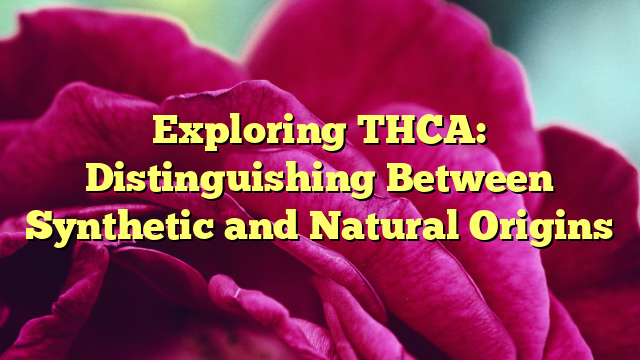Exploring THCA: Distinguishing Between Synthetic and Natural Origins
Exploring THCA: Distinguishing Between Synthetic and Natural Origins
Tetrahydrocannabinolic acid (THCA) is a non-psychoactive cannabinoid found in fresh and live cannabis. As the plant dries, THCA slowly converts to THC, the compound known for its psychoactive effects. Understanding the difference between synthetic and natural THCA is crucial for consumers, researchers, and policymakers. This article delves into the origins, extraction methods, and implications of both synthetic and natural THCA.
Natural THCA: Source and Extraction
Natural THCA is found in the trichomes of the cannabis plant. It serves as a precursor to THC, which means that through decarboxylation (the process of applying heat), THCA is converted into THC.
Extraction Methods
- Ice Water Hash: This method uses ice and water to separate trichomes from the plant material. The resulting product is then dried, containing a high concentration of THCA.
- CO2 Extraction: Supercritical CO2 extraction is a solvent-free method that uses carbon dioxide under high pressure and low temperature to isolate cannabinoids, including THCA.
- Alcohol Extraction: High-proof alcohol can be used as a solvent to extract cannabinoids. The alcohol is then evaporated, leaving behind a concentrate rich in THCA.
Synthetic THCA: Laboratory Creation
Synthetic THCA is created in a laboratory setting, often for research purposes or as a legal loophole in regions where THC is prohibited. The synthetic version mimics the chemical structure of natural THCA but can have different effects and safety profiles.
Production Techniques
- Chemical Synthesis: This involves using chemical reactions to create THCA from non-cannabis substances. The process requires advanced laboratory equipment and expertise.
- Biosynthesis: A newer method that involves engineering yeast or bacteria to produce THCA. This method is considered more sustainable and less harmful to the environment.
Comparing Natural and Synthetic THCA
| Aspect | Natural THCA | Synthetic THCA |
|---|---|---|
| Source | Cannabis plant | Laboratory synthesis |
| Extraction/Production Method | Ice Water Hash, CO2, Alcohol Extraction | Chemical Synthesis, Biosynthesis |
| Environmental Impact | Depends on cultivation and extraction methods | Lower with biosynthesis, variable with chemical synthesis |
| Legal Status | Varies by jurisdiction, often tied to cannabis legality | May be legal in places where THC is banned, but regulatory status is evolving |
| Health Implications | Generally considered safe when sourced from reputable producers | Potential unknown risks due to lack of long-term studies |
Implications for Consumers and Policymakers
The distinction between natural and synthetic THCA has significant implications for consumers, healthcare providers, and policymakers. Natural THCA, when properly sourced and produced, is generally considered safe. However, the synthetic version poses potential risks due to the lack of comprehensive studies on its long-term effects.
Consumer Awareness
Consumers should be informed about the source of THCA in products they consume. Understanding the differences between natural and synthetic origins can help consumers make informed decisions about their health and safety.
Regulatory Challenges
Policymakers face challenges in regulating synthetic cannabinoids, including synthetic THCA. The rapidly evolving nature of synthetic cannabinoid production complicates efforts to establish clear regulatory frameworks. Ensuring the safety and efficacy of these compounds requires ongoing research and adaptable policies.
Conclusion
THCA, whether of natural or synthetic origin, plays a significant role in the cannabis industry and in scientific research. While natural THCA has a long history of use and is generally considered safe, synthetic THCA presents both opportunities and challenges. Consumers should remain informed about the origins of THCA in their products, and policymakers must navigate the complex landscape of cannabinoid regulation. As research progresses, the understanding of THCA and its implications will continue to evolve, highlighting the importance of science in guiding policy and consumer choice.

